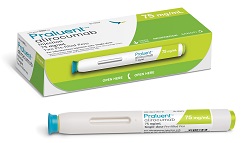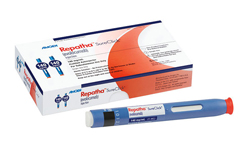As they rolled out disappointing news on their PCSK9 sales over the past few weeks, Amgen ($AMGN), Sanofi ($SNY) and Regeneron ($REGN) promised better times are coming--and soon. Payer negotiations are bearing fruit, and once coverage kicks in, script numbers will start to build.
That's the idea, anyway. But Express Scripts' ($ESRX) outspoken chief medical officer, Steve Miller, doesn't see prescriptions ramping up much all year.
 Doctors are skeptical about using Amgen's Repatha, and Sanofi and Regeneron's Praluent, in any sort of broad way, at least for now, Miller says. That's partly because they're pricey--more than $14,000 per year before negotiated rebates--and partly because their benefits remain unproven.
Doctors are skeptical about using Amgen's Repatha, and Sanofi and Regeneron's Praluent, in any sort of broad way, at least for now, Miller says. That's partly because they're pricey--more than $14,000 per year before negotiated rebates--and partly because their benefits remain unproven.
"Cardiologists are waiting for health outcomes data," Miller told Reuters over the weekend.
Both Repatha and Praluent are under testing in big clinical trials to determine whether they cut the risk of heart attacks, strokes and cardiovascular death. Early data from those trials--Fourier for Repatha and Odyssey Outcomes for Praluent--are due later this year, with Repatha coming in first, but full results won't be ready till next year and beyond.
Other payers also say they've seen less interest in PCSK9s than they had previously expected, Leerink Partners analysts wrote in a note to investors on Tuesday. At a conference sponsored by the firm, a selection of PBMs and insurers cited "very low numbers of requests from PCSK9s from physicians."
And the problem isn't just prior authorization, the analysts wrote. "The specialists suggested that the physician and patient demand for the drug has been surprisingly modest … attributable to several factors, including the lack of patient interest in injectables for chronic asymptomatic conditions, the effect of high patient co-pays and the impact of increasing physician accountability for overall patient costs."
To turn things around, the outcomes data will need to be strong--really strong, these payers said. To change payers' stance and to really boost adoption of the drugs, they'll need to see "substantial benefit in the outcomes trials, including overall survival," Leerink said. What's substantial? "[C]loser to 50% than 25%," Leerink's Geoffrey Porges quoted them as saying.
Compare that to Merck & Co.'s ($MRK) Zetia/Vytorin outcomes trial, IMPROVE-IT, which produced an overall risk reduction in the single digits. That data was hailed last year as a good sign for the PCSK9s, suggesting as it did that hefty LDL reductions really would deliver on the outcomes side. The data didn't pay off for the Merck franchise, however; on Friday, the FDA declined to add the risk-reduction claim to Zetia and Vytorin's labeling, a blow to the drugs' near-term marketing prospects.

Can Repatha and Praluent deliver the goods? Amgen R&D chief Sean Harper said during the company's fourth-quarter earnings call that IMPROVE-IT's results fell right in line with previous outcomes trials with statins, showing a "linear relationship" between LDL reduction and risks.
And at Leerink's conference, Regeneron CEO Len Schleifer suggested a similar conclusion. The companies "powered their study to detect what they consider to be a clinically meaningful composite risk reduction of 15%," Porges wrote in a note to investors last week. Schleifer "believes that a much greater effect size is likely, and anticipates the outcomes improvement will be proportional to the absolute LDL reduction."
Only time will tell, of course. Top-line results of Amgen's trial are expected by year's end, and Regeneron anticipates Praluent data as early as the end of this year, if the study is unblinded early as many expect.
- see the Reuters story
Special Report: Top 15 pharma companies by 2014 revenue - Sanofi - Amgen | 10 top drugs in biopharma's late-stage pipeline - Alirocumab